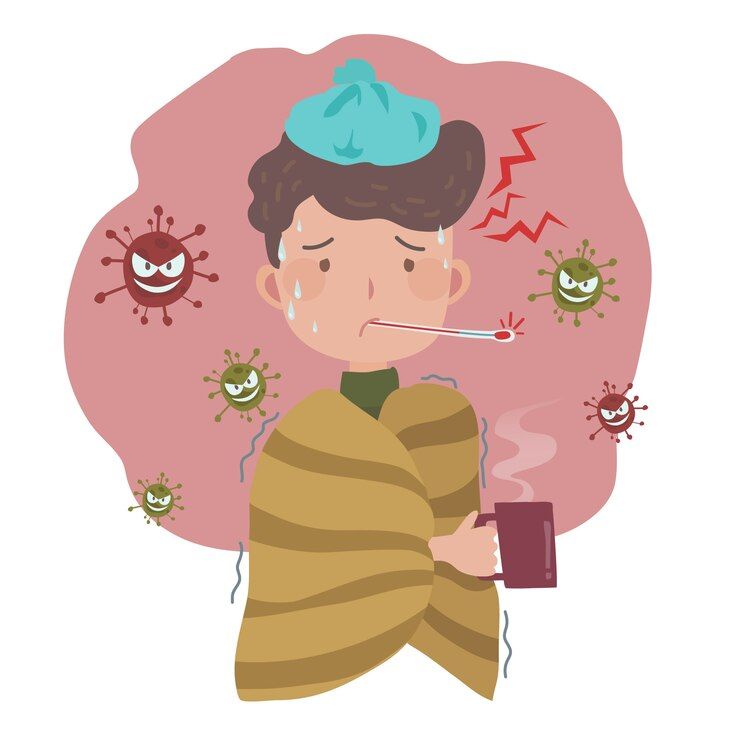
Get A Quote
Is Diarrhea a Symptom of the Flu Virus?——Let’s Find Out
Join us on this journey to explore why, how, and for how long the flu might bring this unexpected twist to the symptom saga. From cytokine releases to potential medication side effects, we're diving into the nitty-gritty of flu-related gastrointestinal surprises. Let's decode the mysteries and get you armed with knowledge as we navigate the unexpected twists the flu can throw our way!
 Does the Flu Give You Diarrhea?
Does the Flu Give You Diarrhea?
Having the flu is undeniably challenging, with symptoms persisting for an average of 7 to 10 days. While familiar symptoms like fever, fatigue, a stuffy nose, and cough often accompany the flu, the inclusion of stomachaches, diarrhea, and nausea might leave you wondering if the flu is the culprit or if another illness has coincided. Surprisingly, the flu can indeed cause diarrhea. If you find yourself grappling with this uncomfortable combination of flu-like symptoms, understanding the connection between the flu and diarrhea is crucial. In this scenario, it's essential to recognize that flu-related diarrhea is a real phenomenon.
Is Diarrhea a Symptom of the Flu Virus?
Yes, diarrhea can indeed be a symptom of the flu, although it's not very common, especially in adults. Children, on the other hand, are more likely to experience symptoms like diarrhea, nausea, and vomiting when infected with the influenza virus, which causes the flu. While most adults are unlikely to experience diarrhea with the flu, variations can occur depending on the circulating strains each year. Children, especially those infected with influenza B, are more predisposed to developing diarrhea as a flu symptom.
Why Does the Flu Give You Diarrhea?
The uncertainties surrounding why the flu may lead to diarrhea involve a combination of factors, including the immune response triggered by cytokines, potential side effects of flu medications, and the complicating factor of co-infection with COVID-19. Scientists propose a couple of potential explanations for the occurrence of diarrhea during the flu.
- Cytokine Release: Cytokines, proteins that signal the immune system and trigger inflammatory responses, are released during sickness. This release, responsible for various flu symptoms, might also contribute to diarrhea.
- Flu Medications: Medications like Oseltamivir (Tamiflu) and baloxavir marboxil (Xofluza), approved to treat influenza infections, can induce side effects, including diarrhea. Confusion often arises as these medications work best when started within 48 hours of flu onset, making it challenging to distinguish between virus-induced symptoms and medication side effects.
- Co-infection with COVID-19 (Fluorna): Co-infection with influenza and COVID-19, termed "fluorna," is common. Both illnesses share similar symptoms, making it difficult to discern between the two. However, a key differentiator is that diarrhea is a common symptom of COVID-19. If experiencing diarrhea alongside flu symptoms, it is advisable to take a COVID test to rule out co-infection.
How Does the Flu Cause Diarrhea?
The flu, caused by the influenza virus, primarily targets the respiratory system, leading to symptoms such as fever, cough, and body aches. However, some individuals may also experience gastrointestinal symptoms, including diarrhea. The connection between the flu and diarrhea can be attributed to several factors. Firstly, the virus can directly infect the digestive system, causing inflammation and disrupting its normal functioning. Additionally, the body's immune response to the flu can trigger the release of inflammatory molecules, affecting the gastrointestinal tract. Furthermore, the flu often leads to dehydration due to fever, sweating, and increased respiratory secretions, which can contribute to diarrhea. While not everyone with the flu will experience gastrointestinal symptoms, understanding the potential mechanisms behind flu-induced diarrhea highlights the multifaceted nature of the virus and its impact on various bodily systems.
How Long Can Diarrhea Last with the Flu?
The duration of diarrhea during a flu infection varies, hinging on individual factors and the overall severity of the illness. Generally, flu symptoms persist for a span of 2 to 5 days, constituting the typical duration for most individuals. However, this timeframe may extend for those with a weakened immune system, potentially prolonging the overall flu experience. Notably, flu-related diarrhea typically abates in tandem with other flu symptoms, though occasionally it may resolve earlier. The dynamic nature of how long diarrhea lasts with the flu underscores the importance of considering individual health conditions and immune responses in predicting the course of the illness.
Conclusion
In conclusion, the flu can indeed cause diarrhea, more common in children. The link involves cytokine release, medication side effects, and potential co-infection with COVID-19. The flu's impact on the respiratory system, dehydration, and inflammatory responses contribute to gastrointestinal symptoms. The duration of flu-related diarrhea varies, influenced by individual factors and immune strength. Understanding this connection is crucial for effective symptom management and care during the flu. If you want to learn more about flu knowledge, come to Aichek and consulate our experts!

